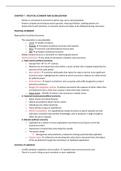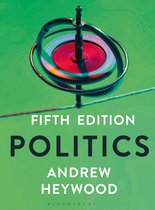CHAPTER 7 – POLITICAL ECONOMY AND GLOBALIZATION
- Politics is connected to economics (all the way up to nationalization)
- Powers compete promising economic growth, reducing inflation, tackling poverty ect
- Governments with elections in economic booms are likely to be defeated during recessions
POLITICAL ECONOMY
Approaches to political economy
- The separation is unsustainable
o Smith → wealth of nations
o Ricardo → Principles of political economy and taxation
o Marx → economic and philosophical manuscripts
o Mill → principles of political economy
- Global markets serve as a constraint on national governments
- Political economy → the study of interaction of politics and economics
- 1. State centric political economy
o Europe from 15th to 17th century
o Markets are not natural but exist within a social context that is largely shaped by the
exercise of the state power
o Mercantilism → economic philosophy that takes the state to be the most significant
economic actor, highlighting the extend to which economic relations are determined
by political power
o Protectionism → import restrictions such as quotas and tariffs designed to protect
domestic producers
o Beggar-thy-neighbour policies → policies pursued at the expense of other states that
are believed to be in their won country’s short-term best interests
o Adam Smith – Wealth of nations, the economy in market terms
- 2. Classical/neoclassical political economy
o Adam Smitch and David Ricardo
o Liberal assumptions about human nature
o Individuals are utility maximizes
o There will be a long-run equilibrium
o Perfect competition → a hypothetical market structure in which markets are free
and open, consumer have perfect knowledge, and no producer is large enough to
affect the price of goods
- 3. Marxist political economy
o Capitalism as a system of class exploitation and treats social classes as the key
economics actors
o Importance of ownership and productive wealth
o Two great classes
▪ Bourgeoisie and proletariat, proletariat is being systematically exploited
o Surplus value → a Marxist term denoting the value that is extracted from the labour
of the proletariat through the mechanism of capitalist exploitation
Varieties of capitalism
- Conflict between capitalism and socialism → Capitalist west and communist east
- There’s no such a thing as pure socialism or pure capitalism
, - Economic system → a form of organization through which goods and services are produced,
distributed and exchanged, seen by Marxists as a mode of production
- Capitalism – economic system or ideology
o 1. Productive wealth is predominantly privately owned
o 2. Economic life is organised according to market principles, resources being
allocated through the price mechanisms
o 3. Wage labour replaces bonded serfdom
o 4. Material self-interest and profit maximization provide the motivation for
enterprise and hard work
- 1. Enterprise capitalism
o Liberal capitalism/American business model/pure capitalism
o Smith, Ricardo, Friedman, von Hayek
o Invisible hand
o Laissez-faire → principle of non-intervention of government economic affairs
o Reagan’s and Thatcher’s government
o Disadvantages: wide material inequalities, deep social tensions
- 2. Social capitalism
o Developed in Central and Western Europe (Germany, Austria, Benelux, Sweden,
France, Scandinavia)
o Friedrich List
o State intervention should be used to protect infant industries from the rigorous of
foreign competition
o Social market, need for social cohesion and solidarity
o Strengths: economic miracle, strong emphasis on education
o Drawbacks: heavy stress on consultation and negotiation, inflexible, pushing up taxes
o Social market → economy that is structured by market principles and largely free
from government interference, operating in a society in which cohesion is
maintained through a comprehensive welfare system and effective public services
- 3. State capitalism
o Refers to capitalism economic in which the state plays a crucial directive role
o Hall and Soskice
o Southeast Asian tigers → Hong Kong, South Korea, Taiwan, Singapore
o In some respects also China and Russia
o Cooperative long-term relationships, collective capitalism
o Public spending and taxes relatively low by international standards
o Inflexibility to changing market conditions, values such as duty and hierarchy
Managed or unmanaged capitalism?
- Proper balance between politics and economics, between the state and the market
- Keynesianism → a theory or policy of economic management, associated with regulating
aggregate demand to achieve full employment
- John Keynes – The general theory of employment, interest and money
o Effect on liberalism and social democracy
- When unemployment rises, government should reflate the economy either by increasing
public spending or by cutting taxes
- Multiplier effect → the mechanism through which a change in aggregate demand has an
increased effect on national income as it circulates through the economy
- Milton Friedman – economist, Chicago school





